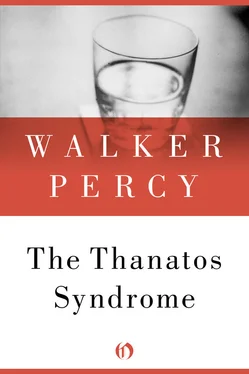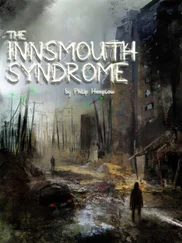Van Dorn, who has taken my hand in both of his, is shaking his head in mock outrage. “You old scoundrel beast,” he says, and coming close: “I got some great news for you.” He notices the uncle’s shotgun propped by the door. “How do you like these guys?” he says to nobody in particular. “Probably poaching and shooting Belle Ame deer out of season. Mr. Hugh Bob, why don’t you show the folks that Purdy? He’s a hard man, Tom. Did you know I offered him five thousand for it?”
“I been offered ten thousand,” says the uncle, who, however, is glad to show off his shotgun, walking from one person to another. They look politely.
“When you going to take me to Lake Arthur, Mr. Hugh Bob?” asks Van Dorn.
“Like I told you,” says the uncle, “there ain’t no ducks there. We’ll have to go to Tigre au Chenier.”
“You got a deal.”
The uncle, pleased, blows a few feeding calls.
“How about that guy?” Van Dorn is still shaking my hand. “I don’t know how you fellows got in here, but I’m delighted to see you.”
“We came by the river. The gate is locked. We came to pick up Claude. His father was anxious about him.”
Van Dorn lets go of my hand, grows instantly sober, paces.
“I know, I know. Would you believe we’ve had threats from some locals, Kluxers, fundamentalists, fundamentalist Kluxers; I mean, God knows. But we’re not going to let a couple of rednecks scare us, are we, Claude?”
Claude says nothing, stands at ease, gazing at a middle distance.
“Mr. Bon,” says Van Dorn to Vergil, “I understand your anxiety, but I can assure you we’re delighted to have him and he’s perfectly safe here.”
“I think we’ll be on our way,” says Vergil.
“No problem,” says Van Dorn. “A fine boy,” he adds absently. “Make a world-class goalie.”
Now we’re sitting on the two bamboo lounges, with a scarred plywood table between marked out as a checkerboard and a Parcheesi game.
There follows a period of social unease, like a silence at a dinner party. But Van Dorn goes on nodding good-naturedly, as if agreeing with something. Vergil, hands on knees, shoots a glance at me. I am silent. The uncle, restless, stands at Mrs. Cheney’s end of the couch, eyes rolled back.
Vergil opens his hands to me: What—?
Van Dorn claps his hands once. “Two pieces of news, Tom,” he says in a crisp voice. “And I see no reason to keep either secret, since we’re all friends here. As a matter of fact, it is serendipitous that you should have dropped by, since I couldn’t call you — it seems the yahoos have cut my line. Number one: I’m going to be moving on. To a little piece of work at M.I.T., Tom,” he says in a sober yet cordial voice. “I’ve paid my dues here. But the time comes — The school will be in good hands — in fact, no doubt better off without me — like my friend Oppie at Los Alamos, I seem to arouse controversy. Number two,” he counts, leaning toward me across the table. “You’re in, Doctor. You’ve got your grant from Ford: $125,000 per. Not great, not adequate compensation for your contribution, but you’ll have time for your practice plus research access to Fedville — you can name it. They just want you aboard.”
Ricky has left the Star Wars 4 game and is kneeling at the half-finished game of War, evening up the deck against his stomach and eyeing me impatiently.
I do not reply. As all shrinks know, it is useful sometimes to say nothing if you want to find out something. In the silence that follows, it is Vergil with his sense of social propriety who feels the awkwardness most. His expression as he looks not quite at me is worried and irritable.
“We’ll finish the game later, Ricky,” I tell him. “I’ll tell you what let’s do.”
“What?”
“Uncle Hugh, my car is parked by the front gate. Here are the keys. Why don’t you take these two boys out to the car and wait for us. We’ll be along in a minute.”
“Is that your car out there?” says Van Dorn, looking up in surprise. “For heaven’s sake.”
“But why—” Mrs. Cheney begins.
“But—” says the uncle, next to Mrs. Cheney.
“He’s the best duck caller in the state,” I tell Ricky. “He’ll show you how to call ducks, won’t you, Uncle Hugh?”
“Sure, but—”
“Get going.”
“It’s perfectly all right, boys,” says Van Dorn. “No sense in them sitting around listening to us old folks discussing the state of the world,” he explains to us. “Hold it, fellows. Let me give you a key to the front gate — I’m sure you understand my precautions, Tom.”
“They’re not going anywhere. Give it to me.”
“Sure thing!” He hands me a key. He watches fondly as the boys leave with the uncle. “Good boys, both of them. I’ll miss them. I’ll miss them all.”
After the door closes, Van Dorn claps his hands again. “Tell you what, Tom,” he says, rising. “Why don’t you and I walk over to my study and have a tad of bourbon by way of celebration.”
“No thanks.”
There is another silence. “Very well,” says Van Dorn presently, fetching his pipe from a pocket of his Norfolk jacket. “What’s your pleasure, Doctor? What can I do for you?”
“I’m curious about that water, Van.” I nod toward the cooler. Both Van Dorn and Vergil look relieved. It is, I think, social relief. Not talking makes people uneasy.
“The water?”
“Do you drink it, Van?”
“No, I’m not in training. But it’s no big deal.” With a flourish, Van Dorn takes a Styrofoam cup, fills it from the cooler, drains it off. “Want one, Tom?”
I rise, go to the cooler, take a cup. Van Dorn watches me with a lively expression. I unclamp the hemostat, fill the cup not from the fountain but from the tube.
I hear Van Dorn shuffle his feet, “You’re not going to drink that,” says Van Dorn with genuine alarm.
“Why not?”
“Come on, Tom. Knock it off. You know what the additive is — Christ, it’s no secret. And you’ve also seen what it does in minimal dosage — Ricky, for example. And his father does not object. But in micrograms, not molar. And as a matter of fact, I do drink a glass now and then. As a matter of fact, you could use a bit.”
“Did Ellen drink any?”
“Not to my knowledge. If she did,” says Van Dorn to Vergil for some reason, knocking out his pipe, “it was her choice. After all she’s one of our best volunteers and she may have seen me toss off a little cocktail.” Now he turns to me. “Ricky was flunking math before he came here. Interesting, don’t you think, Tom?”
“Then why not drink this?” I offer him the Styrofoam mug.
Van Dorn is embarrassed for me. He ventures a swift glance at the others. Vergil is embarrassed too, won’t meet his eyes.
“Tom, that is molar sodium 24.”
“I know.”
Now he’s stuffing his pipe from the leather pouch. “Tom, may I be frank?”
“Yes.”
“Are you quite all right?”
“Yes.”
“You seem — ah — not quite yourself. Mr. Bon, is our good friend here all right?” Pausing in his pipe-stuffing, he eyes Vergil shrewdly.
“He’s fine,” says Vergil, not looking up. He’s not sure I am all right.
“Then it must be some kind of joke. Because he knows as well as I do — better! — that that’s molar sodium 24. And he certainly knows what it would do to you.”
“I wasn’t intending to drink it,” I say.
“I see.” Van Dorn takes time to light his pipe. “Why don’t I stop this stupid smoking.” He appears to collect himself. “I see. Then who is going to drink it?”
“You.”
“Me,” says Van Dorn gravely, exchanging a glance with Vergil. “Anybody else?” No one replies. He shakes his head, rolls his eyes toward Vergil.
Читать дальше












